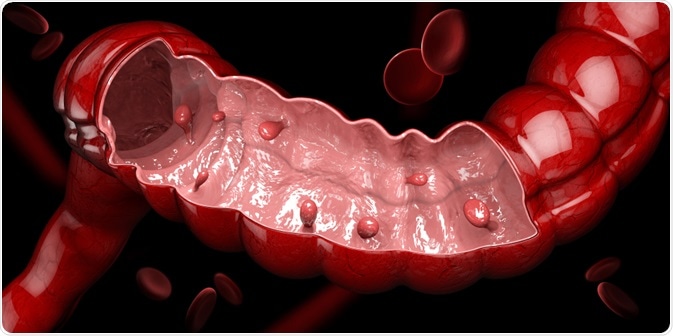Juvenile polyposis syndrome (JPS) refers to a condition in which there are multiple benign polyps in the colon, or large intestine. Polyps are outgrowths occurring on the inside of a hollow organ. The number of polyps in juvenile intestinal polyposis may range from less than five up to a hundred.

Image Credit: Victor Josan / Shutterstock.com
JPS is referred to as ‘juvenile’ because of the immature nature of the tissue that makes up the polyps. Most JPS patients manifest this condition before they are 20 years old. JPS often runs in families; however, different family members may be affected to varying degrees. It is currently estimated that JPS affects 1 in every 100,000 individuals.
Causes
Juvenile polyposis is caused by mutations in certain genes that regulate the signaling between cell membranes and nuclei. This altered signaling disrupts the way in which the growth and proliferation of cells occurs, ultimately leading to the uncontrolled multiplication of intestinal mucosal cells and the formation of polyps.
The most commonly affected genes associated with JPS include the BMPR1A and SMAD4 genes. The mutations are transmitted in an autosomal dominant fashion, which means only one parent needs to possess the abnormal gene copy for a child to inherit it. In a quarter of all cases, the mutation arises de novo.
Symptoms
JPS may first arise in the form of bleeding from the gastrointestinal (GI) tract or as signs of anemia secondary to the GI bleed. Abdominal pain and diarrhea are other symptoms of JPS.
Associated anomalies
Other abnormalities are present in about 15 of every 100 patients with JPS, of which include:
- Intestinal malrotation
- Anomalies of the heart, brain and/or genitourinary tract
- Cleft palate
- Having more fingers than normal
Types of JPS
Juvenile polyposis of infancy
In this form of JPS, juvenile polyps are present throughout the gastrointestinal tract and first develop during the patient's infancy. This conditions is considered to be most severe form of JPS and therefore has the worst prognosis. Most infants with this syndrome develop a serious complication called protein-losing enteropathy, which leads to diarrhea, weight loss and failure to thrive.
Generalized juvenile polyposis
In generalized JPS, polyps are found throughout the colon and begin to develop during childhood.
Juvenile polyposis coli
In this condition, juvenile polyps grow only in the large intestine from childhood onwards.
Complications
JPS is characterized by completely benign polyps; however, the development of a cancerous change in one or more of the polypoid growths is a feared complication. A cancerous change could occur as a result of the uncontrolled proliferation of cells within these growths. The relatively high cancer risk ranges from 10 to 50 percent. Colorectal cancer is thus the most common form of cancer occurring in people who have JPS.
Diagnosis
Diagnosis of JPS is based on findings of typical juvenile polyps in the intestine. A positive family history or symptoms of polyposis are considered to be good reasons to undergo screening for this condition.
.jpg)
Image Credit: Doro Guzenda / Shutterstock.com
JPS is commonly diagnosed by finding polyps in the intestine upon bowel examination by colonoscopy or a barium X-ray. Ultimately a biopsy is required to confirm JPS following polyp visualization. DNA analysis for the presence of specific mutations is also advised when juvenile polyps are found on histopathological examination.
Management of JPS may involve removal of all the polyps with a follow-up screening at regular examinations. In some cases, there may be so many polyps that removal of part of the colon is considered necessary.
References
Further Reading
Last Updated: Mar 17, 2021